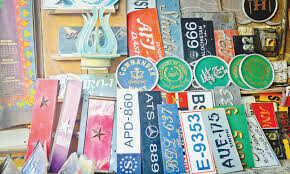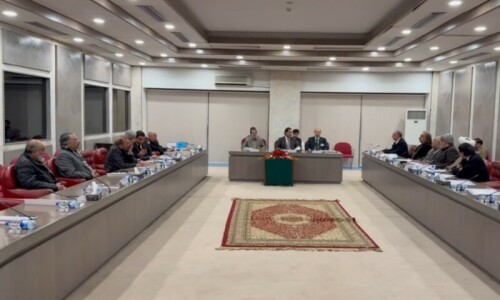KARACHI, Dec 24: To celebrate dance and theatre group Tehrik-i-Niswan's 31 years in the realm of the performing arts, a two-day conference titled , is going to be held from Dec 25 on the Oxford University Press premises. The participants were introduced to the media at an event which was interspersed with a delectable mélange of dance performances, songs, visual presentation and a brilliantly acted-out short play at the OUP on Friday.
Founding member and renowned theatre practitioner Sheema Kermani talked about the genesis of Tehrik-i-Niswan (1979) and its endeavours to highlight women-oriented issues and an egalitarian society. She mourned the fact that gradually things related to the arts were disappearing from society, something that ought to be taken into account. She said it's the arts (and they're all interrelated) that raise issues like what culture is and why it is important for any society. Culture is a way of life, she iterated. “It's the pursuit of knowledge, an attempt to find meaning of life… Culture brings people together, leads to harmony and cohesion. Art enables us to comprehend reality and makes it worthy for mankind.”
Then she apprised the audience of the papers that will be read during the course of the two days of the moot and introduced the conference's participants with their brief resumes. Some of them are: Stefanie Oberhoff (set designer, puppeteer and director from Germany), Dr Lata Singh (associate professor in Department of History, Delhi University), Intizar Husain (renowned fiction writer), Zaheda Hina (Urdu essayist and columnist), Arif Hasan (architect and planner), Kamran Asdar (teaches anthropology at the University of Texas) Madhu Kishwar (senior fellow centre for the study of developing studies, Delhi), Dr Jamil Ahmed (professor Department of Theatre, University of Dhaka), Claire Pamment (ex-head of the Department of Theatre, NCA, Rawalpindi), Dr Asif Farrukhi (writer and translator) and Madeeha and Faryal Gauhar (theatre and television personalities).
This was followed by a panel discussion in which Dr Asif Farrukhi, Kamran Asdar and MD OUP Ameena Syed took part. Asif Farrukhi spoke on the strong impact of street theatre that Tahrik-i-Niswan had on the general public and the group's contribution to the Urdu language. Kamran Asdar said Sheema Kermani was an iconic figure who did a brave job in the field of theatre, particularly during the dark days of General Ziaul Haq's rule. Ameena Syed praised the tehrik's role in supporting the women of the country. She referred to a recent incident of the rape of two girls in Karachi and how some people had insensitively responded to it; she suggested that against that background the conference was a timely event.
The speeches were followed by a host of performances that began with two recitals (theatrical and visual) on Fahmida Riaz's poems Chador Aur Char Deewari and Aseer Shahzadi. This was an apt time for Fahmida Riaz to be invited on stage. She read a moving essay on her association with Tehrik-i-Niswan, intermingled with her poems. Her paper had literary flair containing fond recollections.
After that an 11-year-old girl Iman Mirza came for a dance performance. The girl has been learning Bhartanatiyam from a very young age. She did a nice job. Then another of Tehrik-i-Niswan student Mani Chao (from Baltistan) performed another classical dance number.
What followed was a beautiful piece of singing from Sakuntala Narasimhan from Bangalore. The musicologist sang Amir Khusrau's Zihal-i-Miskeen in a raga that she named aman, and at the end of the song paid a tribute in two lines in the same composition to Tehrik-i-Niswan. Next up were two songs often sung in the tehrik's plays, presented by all the members of the theatre group that were present there.
But the last act of the evening, enactment of a short play Kafir by Ismat Chughtai, proved the icing on the cake. Asma Mundrawala and Saleem Mairaj played the characters of a Muslim girl and Hindu boy respectively, in love with each other and wanting to get married, yet constantly exchanging (clever) barbs at one another's faith. Their bantering was true-to-life and depicted a culture that today doesn't exist. Despite the informal setup, the acting was effortless and made the audience transfixed on the short play.—PS














































Dear visitor, the comments section is undergoing an overhaul and will return soon.